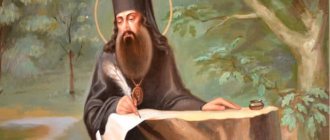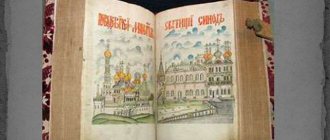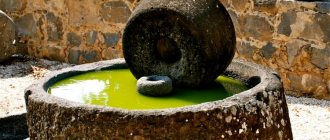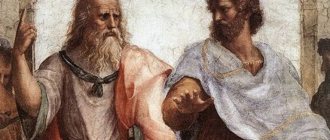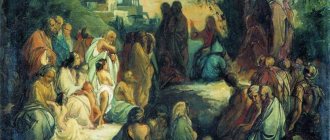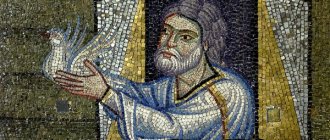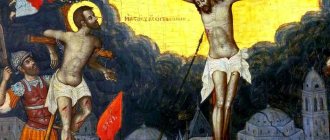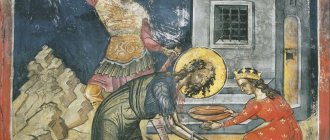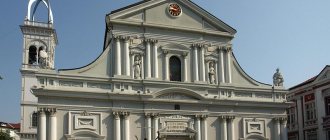John 8:51. Truly, truly, I say to you, whoever keeps My word will never see death.
What did He tell them? “Whoever keeps My word,” that is, unites a pure life with faith (for he only truly observes the teachings of the Lord who also has a pure life), such will not see the death by which sinners die, given over to endless torment in the next century and falling away from the true life.
At the same time, he lets them know that if he who keeps My word does not die, how much less do I? Why do you want to kill Me, over Whom death has so little power that I even give true life to others? For although believers die bodily, yet they are alive in God.
John 8:52 . The Jews said to Him: Now we have learned that you have a demon. Abraham died and the prophets, and You say: whoever keeps My word will never taste death.
What do the Jews say to this? They consider Him to be mad, as if He were saying some strange things out of damage to his mind. Abraham and the prophets who heard the words of God died, how can Your listeners not die? “Now,” they say, “we truly, that is, completely and firmly, have learned that You are going berserk when you say this.”
John 8:53 . Are You greater than our father Abraham, who died? and the prophets died:
Madmen, not understanding what kind of death the Lord was talking about, that it would not affect those who believe in Him, tell Him something reckless and insane. Watch how they respond. “Are You greater than our father Abraham?” They should have said: “Are You greater than God? Those who heard the word of God died, but those who listen to You will not die.” But they are not. Wanting to show that He is less than Abraham, they say: “Are You really greater than our father Abraham?”
The Lord Himself does not reveal to them what kind of death He spoke about. And that He is higher than Abraham, this is convinced a little later.
what are you doing with yourself?
They say this as an insult. You, unworthy of a single word, Son of a carpenter, Galilean, what are you doing with yourself? Neither works, nor truth, nor Scripture, but what do You make Yourself with? For You take the glory to Yourself.
John 8:54 . Jesus answered: If I glorify Myself, My glory is nothing. My Father glorifies me, of whom you say that He is your God.
The Lord says to this: “If I glorify Myself, then My glory is nothing, as you think. But now the one who glorifies Me is someone else, namely My Father.”
The Father glorified Him in every possible way, sometimes with prophecies about Him, sometimes with testimony from heaven, sometimes with countless and immeasurable miracles. Of this Father you say that He is your God. But you do not recognize Him either as My Father or as your God. If you acknowledged Him as Father, you would honor His Son. But now you do not honor His Son. Obviously, you do not recognize Him as My Father. But you do not recognize Him simply as God. Otherwise you would fear His words as God. Now you resolutely neglect Him. He decreed by law: “Thou shalt not kill.” You seek to kill Me, and, moreover, when you cannot convict Me of sin.
John 8:55 . And you did not know Him, but I know Him;
It is now clear that you do not know Him at all. But I know Him by nature, I have perfect knowledge of Him. For as I am, so is the Father. And just as I know Myself, I know Him too.
and if I say that I do not know Him, then I will be a liar like you.
For you lie when you boast that you know Him; and I will renounce the truth if, knowing Him, I say that I do not know.
But I know Him and keep His word.
How will you prove that you know Him? “By this,” he says, “because I keep His word, that is, His commandments.” For I am not an opponent of Him, otherwise I would boast as an opponent of God, and I do not violate His commandments. And you, transgressors of His commandments, are in captivity, indulging in evil lusts, thirsting for murder and many other things prohibited by law, you commit with passion and thereby clearly reveal that you do not know Him. For if you knew Him, you would keep His word, that is, the commandments.
Other words “I keep His word” are understood as follows: therefore I know Him, because in Myself I have an unchangeable image of His Being, that is, being, and what image of Nature the Father has, is the same with Me. For the Father and the Son have one and the same Nature and one and the same way of being. Therefore I know the Father, for I keep the unchanging image of His Being.
This turn of phrase is customary in Scripture. For example, in Slavic it is said “give us help from sorrow: and human salvation is in vain” (Ps. 59:13). Here the particle “and” is used instead of “for”, and the speech has the following meaning: give us help, for salvation from man is unreliable. So in these words, “I know Him, and I keep His word,” the particle “and” is placed instead of “for.” “For,” he says, “I keep His word.”
John 8:56 . Abraham your father rejoiced to see My day; and he saw and rejoiced.
Here he states that He is greater than Abraham. Above they said to Him: “Are You greater than our father Abraham?” Here He answers: “Yes, I am greater.”
He “was glad to see My day,” that is, he considered it pleasant, longed for and joyful, like a very beneficial day and like the day of not a small person, not an ordinary person, but a Great One. “Day” he calls the Cross, for it was typified by Abraham in the offering of Isaac and in the slaughter of the ram. Just as he carried the wood, so the Lord carried the cross, and just as Isaac was abandoned and the ram was slaughtered, so He, as God, remained outside of suffering, but suffered through Humanity and flesh. Foreseeing this day of the Cross as the day of universal salvation, Abraham rejoiced. It also shows that He voluntarily goes to suffer, since He praises the one who rejoiced in the Cross: for through him is the salvation of the universe.
Others by “day” mean the entire time of the appearance of Christ in the flesh, which, having seen, Abraham rejoiced that the Savior would come from him and his descendants. Or maybe not only Abraham rejoiced, but everyone, as David says: “This is the day the Lord has made: let us rejoice and be glad in it!” (Ps. 117:24).
John 8:57 . To this the Jews said to Him: You are not yet fifty years old, and have you seen Abraham?
The Jews, unable to rise to the meaning of His words, instead of asking and finding out what day He is talking about that Abraham saw, ridicule Him even more, as if He were saying something reckless. “You,” they say, “are not yet fifty years old, and have you seen Abraham?” They said this, thinking that the Lord was about fifty years old, while He was about thirty-three years old.
Why didn’t they say, “You are not yet forty years old,” but “fifty”? It would be unnecessary to ask about this. Maybe they mentioned fifty years without a specific thought. However, some say that they said so because they especially honored the fiftieth year, that is, the year of jubilee, in which slaves were set free, buyers gave up their acquisitions and did everything else that was related to honor.
John 8:58 . Jesus said to them, “Truly, truly, I say to you, before Abraham was, I am.”
What does the Lord say? "Before Abraham was, I am." Look, he didn’t say “before Abraham was, I was,” but “I am.” For this saying “I am” is more characteristic of God, because it means continuous and everlasting existence. This is how His Father expressed himself in the Old Testament: “I am this” (Ex. 3:14). About Abraham, as perishable, he decently said “was.” For what has come into being is destroyed. And the word “am” indicates freedom from all corruption and divine eternity.
John 8:59 . Then they took stones to throw at Him; but Jesus hid himself and left the temple, passing through the midst of them, and went on.
Therefore, they too took this saying, as befitting only God, as blasphemy and took stones against Him. But He again hides with humility, so as not to die before the time determined for His death.
How does he hide? He did not hide in the corner of the temple, did not run into the house, did not lean against the wall or behind a pillar, but by Divine power He made Himself invisible to the accusers, although He went out in the midst of them. “And he went on,” that is, he went on like this, simply, for some time.
Look, perhaps, how He fulfilled everything from His side: He taught them enough about Himself and about the Father, and showed them true nobility and freedom in freedom from sins; explained that only slavery is shameful, slavery to sin, and generally did not omit anything necessary. And they throw stones at Him. That is why He leaves them as no longer capable of correction.
Notice that the stones are thrown by those about whom the evangelist said that they believed in Him (John 8:30-31). This means that their faith was not faith, but some kind of temporary and cold disposition towards the speeches of Christ.
On Tuesday, St. John the Baptist
TROPARION ON TUESDAY, St. John the Baptist, tone 2
The memory of the righteous with praise,/ the testimony of the Lord, the Forerunner, suffices for you:/ for you have truly shown that you are more honorable than the prophets,/ that even in the streams of baptism you were deemed worthy of the One who preached./ Those Having suffered for the truth, rejoicing, / you preached the good news to those in hell that God appeared flesh,/ which takes away the sin of the world,// and gives us great mercy.
KONDAC ON TUESDAY, ST. John the Baptist, tone 2
Prophet of God and Forerunner of grace,/ your head, like the most sacred thorn from the earth, will find,/ we always accept healing,// for again, as before you preached repentance in the world.
Venerable Cornelius of Komel
Troparion to St. Cornelius of Komel, tone 4
From my youth we kindled with a burning desire for Divine love, / you left worldly rumors, O Reverend, / a zealot of Anthony the Great, / following Christ in silence and cruel abiding, / with vigil and prayer You became your disciple and became your disciple./ Also praying to the Lord, blessed Cornelius,/ / save our souls.
Kontakion to St. Cornelius of Komel, tone 8
Lord, from the Holy Virgin the world rose up, / and to Him from childhood, like an Angel, you served, blessed one, / and by His power you created the desert, like a city, / and a multitude of disciples in it you gathered, / whom you enlightened with God-inspired teachings./ Therefore we cry to you: Rejoice, our Father Cornelius, monk Divine fertilizer.
Prayer to St. Cornelius of Komel
Oh, sacred head, earthly Angel, Heavenly man, great miracle worker, reverend Father Cornelius! We earnestly resort to you with faith and love, we tenderly ask you, our Heavenly representative: show us, humble and sinners, your fatherly love and your many-powerful intercession, for it is sin for the sake of We do not dare, with the freedom of the children of God, to ask the Lord and our Master about those we need for our needs, but to you, a prayer book favorable to Him, we offer, as a believer, without a doubt, that you can ask us for all the good things from His goodness, if only you desire. Ask us, saints of God, from the All-Merciful and Lover of Mankind, right faith, unshakable piety, perfect repentance, decisive correction of life, and so on, do not anger the Lord by violating His holy commandments and we will be worthy to receive forgiveness of our sins from Him. Pray, O miracle-working saint, the King of kings and the Lord of lords to grant peace and prosperity to our country, so that all who oppose it may know that God and His saints are with us. Save, Holy One of God, with your prayers the Church of Christ from heresies and schisms, superstition and unbelief of man, may holy Orthodoxy bloom in it with all its might and bear fruits that save the soul m. Keep from all evil the monastery you created, and all who live and labor in it according to your statute, so that they may remain safe and sound from the temptations of the enemy of human salvation. Look mercifully at the people who stand before you and pray, who come to your monastery to worship, and fulfill all their requests for good: healing for the sick, consolation for the grieving, help for the needy. Wait a minute. For all of us, spiritual and physical health, fruitful lands, a quiet and godly life, a good Christian death and a good answer at the Last Judgment of Christ from the All-Merciful God, for truly you have great boldness towards Him. Hey, father! We know that your prayer can accomplish much before the face of the Almighty Lord, for this reason we firmly trust in you and in your holy prayer we strongly hope that you will bring us through your representation in heaven Show us the bright haven of salvation and heirs of the all-bright Kingdom of Christ. Do not disgrace, our holy father, our hope and grant us, together with you, the bliss of paradise, let us glorify, praise and magnify the great mercy towards us of the Lover of God, the Father , and the Son, and the Holy Spirit, and your good fatherly intercession, forever centuries. Amen.
Troparion to St. Cornelius of Komel, tone 8
Through the labors of fasting, the easy life of the acquisitive, O Lord, / with the tears of the mental Pharaoh you drowned / and instead of sorrow, you found joy, / standing before Christ in the face of the saints, / / remember, praying thy children, Cornelius, our father.
Features of Orthodox holidays June 1, 2022
In addition to the listed outstanding personalities, the first day of summer also provides for the need for all believers to remember the great deeds that Kaluf the Egyptian did.
Despite the fact that today he is revered among believers, he had to show fortitude against Emperor Maximian.
According to religious teachings, the martyr was born in the territory of Thebes. But due to the fact that he adhered to Christian teachings, which were not supported in those years, during one of the persecutions against the believers, he was captured. To win over the prisoners to their side, extreme measures were used, such as torture instruments.
Despite the fact that the torture continued for a long time, the martyr was able to withstand the violence. However, such demonstrated courage could not serve as a ticket to a happy life. The jailers were not inspired by Kaluf’s fortitude, so after offering to make a sacrifice to the pagan gods, and then refusing such an action, they decided to burn him.
Sad events unfolded in 303.
To the Blessed Prince Dimitry Donskoy
Troparion to the Blessed Prince Dimitri Donskoy, tone 3
Great will you find in troubles, the champion of the Russian land, / conquering languages. / Just as you laid down your pride on the Don Mamaev, / for this feat you received the blessing of the Venerable Sergius, / so, prince Demetrius, / pray to Christ God, / to grant us great mercy.
Kontakion to the Blessed Prince Dimitri Donskoy, voice 2
Your exploits, Saint Demetrius, / God will save our country, / giving you invincible strength. / And now, a strong representative, / observe with the prayers of the saints / your city Moscow is unharmed / / from all the slander enemies.
Prayer to the blessed prince Dimitry Donskoy
Oh, holy servant of God, righteous Demetrius! Having fought a good fight on earth, you received in Heaven the crown of righteousness, which the Lord has prepared for all who love Him. Moreover, looking at your holy image, we rejoice at the glorious end of your life and honor your holy memory. But you, standing before the Throne of God, accept our prayers and bring them to the All-Merciful God, to forgive us every sin and help us to stand against the wiles of the devil, so that we may be freed from sorrows and illnesses, troubles and misfortunes and all evil, let us live piously and righteously in the present and through your intercession we will be worthy, even though we are unworthy, to see good on the earth of the living, glorifying the One in His saints, glorifying God, the Father and the Son and the Holy Spirit, we not and forever and ever. Amen.
Second prayer to the blessed prince Dimitry Donskoy
The Russian army of Christ, the collector, the glorious prince and governor of the Don, Dimitri, the wise military commander, the martyr's host of the holy warriors of Christ, the leader, with many princes, servants at hand to me and my faithful friends my soul for the Holy Faith and the Orthodox Fatherland, blessed by the Venerable Sergius of Radonezh, beloved by the Mother of God, Pray to the Most Holy Trinity, that all God's warriors in the land of Russia, separated from each other and divided by the spirit of satanic malice into one flock of Christ, will be gathered together by Orthodox faith and love by God, united with each other and led by you, on the fields of spiritual battle and in the battles of earthly all enemies those who hate God will soon be defeated, and the glory of Holy Russia will be increased, grace will be attracted to the Russian land, and the Orthodox Kingdom of God will be seen on their Russian land; they will bear worthy fruit of repentance for their sins; and as a great gift from God, they will be crowned with a God-anointed king in the Slavic land; and from this God-chosen Orthodox autocratic Russian Tsar they will receive blessings; and under his hierarchical authority, the Orthodox faithful will become accustomed to the piety; The yoke of Satan will be crushed and the purity of the Gospel light will be revealed to the whole world, just as you, the all-honorable Prince Demetrius, have now seen the Kingdom of Heaven, and stand before the Great Bishop, Mr. Under the Savior Jesus Christ, and from His Most High God's Goodness, we believe that we can ask for great mercies You can, and we too will always magnify the Glory of God the Father, God the Son and God the Holy Spirit, especially your holy great princely leadership for Holy Russia, like a great commander in the great Which battle we remember and honor, where the glory of your righteous life, Prince Dimitri, shines before all the heavenly Angels and Archangels, holy men and sinful people, and ever-present to us on earth, to all of us for the faith of Christ, the Fatherland and the Tsar, to stand inspired to death, always, now, ever and forever and ever. Amen.
Prayer three to the blessed prince Dimitry Donskoy
Oh, holy blessed Grand Duke Demetrius! Even if the days of your earthly life were not many, you have received a great lot from the Creator of all, the Lord, to become famous in the Russian lands and receive eternal bliss in Heaven. Hear us, warm prayer book, our vigilant representative before the Lord! In days of peace and in times of trouble, do not leave us under your care, teach us to be submissive to Divine Providence, everything in our life is for the good of the one who guides, our fatherland through your prayers from the invasions of enemies, Protect and strengthen the ditches and unstructures with your warm intercession. O holy saint of God! Pray, together with your holy wife and companion, the blessed princess Evdokia, that the light of the face of God may shine upon us, and, with this instruction, we will reach the Kingdom of the Truth of Christ, the endless and eternal ́chnago. Amen.
History of Orthodox holidays June 1, 2022
One of the most significant days of remembrance this week fell on the memory of St. Patrick. He at one time served as bishop of Prussa, which was located on the territory of Asia Minor (Bithynia). History claims that he lived there in the first century.
The fate of the bishop is closely connected with three other presbyters revered in Orthodoxy: Polisnos, Menander and Akakios.
Patrick did not like the local government of that time, so he decided to openly support the teachings of Jesus, for which he was sent to trial. Due to the fact that at the time of the trial there was no ruler left in the city, since Julius decided to go to the healing hot springs to improve his health, he issued an unusual decree.
All Christians were first put in iron shackles, and then sent on foot after him. After Julius carried out healing procedures at the springs, he, according to established tradition, made a sacrifice to the pagan gods. He invited all the gathered Christians to repeat after him. Otherwise, people were threatened with terrible torture.
As a result, those brave souls who nevertheless expressed a desire to follow their religious beliefs to the end lost their heads. A bloody event based on religious beliefs occurred around the hundredth year and remained in the memory of believers as one of the most cruel punishments for choosing faith.
Venerable Cornelius, Abbot of Paleostrovsky
Troparion to the Venerable Cornelius, Abbot of Paleostrovsky, tone 5
From my youth, wisely, I labored diligently, / we are instructed by God, / I left my fatherland - the city of Pskov, / and settled in the desert, / in the father of the great Ezer Onega, / the monks gathered wisely / and with notice The Holy Spirit co-created the abode/ and the temple of the Most Holy One Theotokos/ in praise of Her Nativity,/ with the streams of your tears/ you immersed your bodiless enemies/ and united your life with chastity with the angelic faces,/ like Father Cornelius,/ with him below Christ God Ha pray// for our souls to be saved.
Kontakion to the Venerable Cornelius, Abbot of Paleostrovsky, tone 3
Like an Angel in the flesh, he appeared on earth, / was planted with mercy, like Father Cornelius, / you were a mentor to many monks, / for this reason we cry out to you: // pray to Christ God for your souls to be saved ours.
Translation: As an Angel in the flesh, you were on earth, being prepared by fasting, Rev. Father Cornelius, you were a mentor to many monks, therefore we appeal to you: “Pray to Christ God for the salvation of our souls.”
Prayer to St. Cornelius, Abbot of Paleostrovsky
Oh, our reverend Father Cornelius, the great servant of God and quick representative in troubles! Do not forget, as you promised, to visit us, your children; Even though you have departed from us in body, you remain with us in spirit. We pray to you, about the Reverend Father Cornelius, be an intercessor for us, your sinful servants, to the Lord Jesus Christ and His Most Pure Mother of God, our Lady Theotokos, that we may get rid of the eyes yes, destruction, cowardice, flood, fire and sword, from the invasion of foreigners and internecine warfare, from vain death and from all enemies, visible and invisible. O Reverend Father Cornelius! Hear us, your sinful servants, praying to you, and even more so at this hour, falling to you with tears: do not cast us away from your intercession: even though we are sinners, we flow with faith to your honest grave I will lovingly kiss your honest icon, We tenderly call: accept from us, the unworthy, this prayer, like a fragrant incense, like an acceptable sacrifice, and revive and enlighten our souls, who have been killed by evil deeds and thoughts. Our eyes are the eyes of the heart, just as you healed the right eye of the maiden Agathia and made her see , and you appeared to the suffering Boris in a dream, and, from the relaxation of your health, you brought him into a monastic image, as well as us, held by the bonds of the enemy, in whom our evil is bound. will, pluck from the depths of our sins and guide us to the path of repentance, and release from the snare of the devil through your merciful intercession. Amen.
Russian Orthodox Church
print version
The order of readings, according to the calendar:
Polyeleos service in honor of Sschmch. Hermogenes may be moved to Tuesday, February 16 (cf. Typikon, February 24, 4th Markov chapter).Beginning with Vespers, services are performed similarly to Lenten ones: according to “Now you let go” - fasting troparia with bows. At the end of Vespers, Great Compline, Midnight Office, Matins, every hour, pictorial - the prayer of St. Ephraim the Syrian with bows.
At Matins “Alleluia” and the Trinity according to the voice of Octoechos. Canons of Octoechos, Menaion, Triodion with Trisongs. The Lenten troparia on the hours and the Blessed on the icons are read.
17. Cheese Wednesday. Vmch. Theodore Tyrone.
Sschmch. Hermogenes, Patriarch of Moscow and All Russia, wonderworker. St. Barnabas of Gethsemane, Radonezh.
Military service. Theodora Tiron is celebrated together with the services of Octoechos and Triodion.
Note.
Polyeleos service in honor of Sschmch. Hermogenes, Patriarch of Moscow and All Russia, wonderworker, may be moved to Tuesday, February 16 (cf.: Typikon, February 24, 4th Markov chapter).
At Vespers
Kathisma 9th.
On “Lord, I cried” stichera at 6: Octoechos, tone 3 – 3, and martyr. Theodora, voice 2 – 3[1]. “Glory” - martyr. Theodora, voice 6: “The gift of the Holy Orders...”, “And now” - Menaion of the Holy Cross, the same voice: “Weapons, as Simeon spoke...”.
No entry. Prokeimenon of the day.
The poem contains the stichera of the Triodion, tone 1 (with the usual choruses). “Glory” - martyr. Theodora, voice 8: “With suffering courage...”, “And now” - Menaion of the Holy Cross, the same voice: “The Undefiled Youth...”.
According to the Trisagion - troparia, tone 4: “To the Virgin Mary...” (bow)[2]. “Glory” – “To the Baptist of Christ...” (bow), “And now” – “Pray for us...” (bow), “Under Your mercy...” (without bow). Reader: “Lord, have mercy” (40), “Glory, even now,” “The most honorable Cherub...”, “Bless the name of the Lord, father.” Priest: “Blessed be he...” Reader: "Amen." Prayer: “Heavenly King...” Priest - prayer to St. Ephraim the Syrian: “Lord and Master...” (divided into three parts and with a great bow after each), then 12 small bows with the prayer: “God, cleanse me, a sinner,” and again one great bow at the end of the prayer: “Lord and Master..." (without division into parts). Reader: Trisagion[3]. According to the “Our Father” the priest - an exclamation. Reader: “Amen”, “Lord, have mercy” (12). Priest: “Glory to Thee, O Christ God...” Singers: “Glory, even now,” “Lord, have mercy” (three times), “Bless.” The priest creates a great release.
Great Compline is celebrated with bows (at Compline, singing is replaced by reading everywhere).
According to “It is worthy...” and the Trisagion, it is not sung, as during Great Lent, “Lord Almighty, be with us...”, but the troparia of Lesser Compline, namely:
In the Church of the Lord there is a daily troparion: “Save, O Lord, Thy people...”. “God our father...”, “Those all over the world...”. “Glory” - “Rest with the saints...”, “And now” - “Through prayers, Lord...”.
In the Church of the Mother of God and the Saint there is a daily troparion: “Save, Lord...”, the troparion of the temple. “God our father...”, “Those all over the world...”. “Glory” - “Rest with the saints...”, “And now” - “Through prayers, Lord...”.
Reader
: “Lord, have mercy” (40). Prayer: “Likewise at all times...” “Lord, have mercy” (three times), “Glory, even now,” “The most honorable Cherub...”, “Bless in the name of the Lord, father.” Priest - exclamation: “God, be generous with us...”. Reader: "Amen." Priest - prayer to St. Ephraim the Syrian (with 16 bows). Reader: "Amen." The final Trisagion. According to the “Our Father” the priest - an exclamation. Reader: “Amen”, “Lord, have mercy” (12). Prayers: “Undefiled, Unblasphemous...”, “And grant us, Master...”, “Glorious Ever-Virgin...”, “My Hope...”. Priest: “Glory to Thee, O Christ God...” Choir or reader: “Glory, even now,” “Lord, have mercy” (three times), “Bless.” Priest – small release (but not “Master of Much Mercifulness...”). The usual forgiveness from the rector and the litany: “Let us pray for the Great Lord...”, at the end of which the priest says: “Rtsem and for yourself samekh.” Choir: “Lord, have mercy” (three times). Priest: “Through the prayers of our holy fathers...” Chorus: "Amen."
Daily Midnight Office with “her bows” and prayer to St. Ephraim the Syrian (with 16 bows).
At matins
at the cry “Blessed is our God...” - Trisagion. According to the “Our Father” the priest exclaimed: “For Thine is the Kingdom...”. Reader: “Amen”, “Lord, have mercy” (12), “Glory, even now”, “Come, let us worship...”, psalms 19 and 20, and so on in order[4].
Instead of “God is the Lord” - “Alleluia” in the voice of Octoechos (in this case the 3rd). Trinity voices (as during Great Lent). Kathismas 10th and 11th. There are no small litanies.
According to the 1st verse - sedalny Octoechos, voice 3rd.
According to the 2nd verse - sedalny Triodion, voice 2nd.
Psalm 50.
Bible songs “We sing to the Lord...”.
Canto 1 – Octoechos 1st canon[5] with irmos, without martyrs, on 4 (irmos once), Menaion (Martyr Theodore) on 6 (without irmos, canto 1st and 3rd), Triodion complete canon on 4 (without irmos, canto 1).
Canto 3 – Triodion full canon with irmos for 6 (irmos once), three songs of the Triodion for 8 (without irmos)[6].
For the catavasia - Irmos of the 2nd triple song, voice 2: “My unfruitful mind...”.
According to the 3rd song - small litany; sedal vmch. Theodora, voice 4th. “Glory, even now” - Menaion of the Holy Cross, the same voice: “Who is from the Father Without Beginning...”.
Canto 4 – Octoechos 1st canon with irmos for 6 (irmos once), Menaion (martyr Theodore) for 4 (without irmos, 4th canto), Triodion full canon for 4 (without irmos, 4th canto) ).
Canto 5 – Octoechos 1st canon with irmos for 6 (irmos once), Menaion (martyr Theodore) for 4 (without irmos, 5th canto), Triodion full canon for 4 (without irmos, 5th canto) ).
Canto 6 – Octoechos 1st canon with irmos, without martyrs, on 4 (irmos once), Menaion (martyr Theodora) on 6 (without irmos, canto 6th and 8th), Triodion full canon on 4 (without irmos, canto 6).
In response to the chaos - the irmos of the complete canon of the Triodion, tone 4: “Like the prophet Jonah...”.
According to the 6th song - small litany; kontakion and ikos vmch. Theodora, voice 8th.
Canto 7 – Octoechos 1st canon with irmos, without martyrs, on 4 (irmos once), Menaion (martyr Theodora) on 6 (without irmos, canto 7th and 9th), Triodion full canon on 4 (without irmos, canto 7).
Canto 8 – Triodion full canon with irmos for 6 (irmos once), three songs of the Triodion for 8 (without irmos). “We praise, we bless...”
In response to the chaos - the irmos of the 2nd three-canticle, the 2nd voice: “In the bush of Moses the Virgin received a miracle...”.
On the 9th song we sing “The Most Honest”. (The usual incense is performed.)
Canto 9 – Triodion full canon with irmos for 6 (irmos once), three songs of the Triodion for 8 (without irmos).
In response to the chaos - the Irmos of the 2nd three-canticle, the 2nd tone: “Prenaturally formed in the flesh...”.
According to the 9th song, “It is worthy to eat” is sung. Small Litany. The luminary voices of the Trinity (as during Great Lent).
“Praise the Lord from Heaven...” and psalms of praise.
The daily doxology is read.
The poem contains the stichera of the Triodion, tone 1 (with regular refrains). “Glory” - martyr. Theodora, voice 2: “Divine gifts...”, “And now” - Menaion of the Holy Cross, the same voice: “All-ripe grape, Pure...”.
“There is goodness...” (once)[7]. Trisagion. According to the “Our Father” the priest exclaimed: “For Thine is the Kingdom...”. After the exclamation, the troparion is said: “In the temple, worthy of Thy glory...”. “Lord, have mercy” (40), “Glory, even now,” “The most honorable Cherub...”, “Bless the name of the Lord, father.” Priest: “Blessed is Christ...” Reader: "Amen." Prayer: “Heavenly King...” Priest - prayer to St. Ephraim the Syrian (with 16 bows). Reader: “Amen,” and immediately (without the dismissal of Matins) – 1st hour.
Note.
There are no kathismas on the clock. There are no bells struck at every hour, as is customary during Lent.
1st hour “Come, let us worship...” (three times) and ordinary psalms. According to the Lenten rite, the troparion is read (but not sung): “Tomorrow hear...” with its own verses (verse 1: “Inspire my words, Lord...”, and verse 2. “For I will pray to Thee...”). “Glory, even now” – Theotokos of the hour: “What shall we call Thee...”. The verses of the hour: “Direct my feet...” and “Let my mouth be filled...” are read[8]. Trisagion. According to the “Our Father” the priest - an exclamation. Reader - troparion: “Soon foreshadow...”. “Lord, have mercy” (40). Prayer: “Likewise at all times...” “Lord, have mercy” (three times), “Glory, even now,” “The most honorable Cherub...”, “Bless in the name of the Lord, father.” Priest: “God, be gracious to us...” Reader: "Amen." Priest - prayer to St. Ephraim the Syrian (with 16 bows). Reader: "Amen." The final Trisagion. According to the “Our Father” the priest - an exclamation. Reader: “Amen”, “Lord, have mercy” (12). Priest: “Christ, the True Light...”. Choir (according to custom): “To the elected Voivode...”. Priest: “Glory to Thee, O Christ God...” Chorus: “Glory, even now,” “Lord, have mercy” (three times), “Bless.” Release and perennial. Departure into the narthex and the usual litany for the departed.
3rd hour The priest in the stole, in front of the royal doors (the curtain does not open), having made three bows (from the waist), pronounces the exclamation: “Blessed is our God...”. Reader: “Amen”, “Glory to Thee, our God...” and other sequences of the 3rd hour, as usual. According to the Lenten rite, the troparion is read (but not sung): “Lord, Who is Your Most Holy Spirit...” with its verses (verse 1: “Create a pure heart in me, O God...”, and verse 2: “Do not reject me from Your presence..."). “Glory, even now” – Theotokos of the hour: “O Mother of God, You are the true vine...”. “Blessed be the Lord God...”, Trisagion. According to the “Our Father” the priest - an exclamation. Reader – troparion: “Blessed art thou, O Christ our God...”, “Glory” – introparion: “Give quick and well-known consolation...”, “And now” – Theotokos: “Hope and intercession...”. “Lord, have mercy” (40). Prayer: “Likewise at all times...” “Lord, have mercy” (three times), “Glory, even now,” “The most honorable Cherub...”, “Bless in the name of the Lord, father.” Priest: “God, be gracious to us...” Reader: "Amen." Priest - prayer to St. Ephraim the Syrian (with 16 bows). Reader: "Amen." Prayer: “Sovereign God...”, and the 6th hour begins.
6th hour. “Come, let us worship...” (three times) and ordinary psalms. According to the Lenten rite, the troparion is read (but not sung): “And on the sixth day and hour...” with its verses (verse 1: “Inspire, O God, my prayer...”, and verse 2: “Az to I cried to God..."). “Glory, even now” - Theotokos of the hour: “For the imams are not bold...”. Reader - troparion of prophecy (Triodion), voice 3: “To the Holy King...”, “Glory, and now” - the same troparion. Priest (or deacon): “Let us attend.” Reader – Prokeimenon of Triodion, tone 6: “Save, O Lord, Thy people...”; verse: “To You, O Lord, I will cry...”[9]. Priest (or deacon): “Wisdom.” Reader: “Reading the Prophecies of Joel.” Priest (or deacon): “Let us attend.” The reader reads the parody of the Triodion. At the end of the reading, the priest (or deacon): “Let us hear.” Reader – prokeimenon of Triodion, tone 7: “The Lord will give strength to His people...”; verse: “Bring it to the Lord, sons of God...” After singing the prokeemna, the reader: “Soon let us be preceded by...”, Trisagion. According to the “Our Father” the priest - an exclamation. Reader – troparion: “Thou hast wrought salvation...”, “Glory” – introparion: “To Thy Most Pure Image...”, “And now” – Holy Cross: “Glorified art thou, O Virgin Theotokos...”. “Lord, have mercy” (40). Prayer: “Likewise at all times...” “Lord, have mercy” (three times), “Glory, even now,” “The most honorable Cherub...”, “In the name of the Lord...”. Priest: “God, be gracious to us...” Reader: "Amen." Priest - prayer to St. Ephraim the Syrian (with 16 bows). Reader: "Amen." Prayer: “God and the Lord of hosts...”, and the 9th hour begins.
9th hour “Come, let us worship...” (three times) and ordinary psalms. According to the Lenten rite, the troparion is read (but not sung): “Even at the ninth hour...” with its own verses (verse 1: “Let my prayer come near...”, and verse 2. “Let my petition be accepted...”) . “Glory, even now” - Theotokos of the hour: “For our sake...”. “Do not betray us to the end...”, Trisagion. According to the “Our Father” the priest - an exclamation. Reader – troparion: “Seeing the thief...”, “Glory” – introparion: “In the midst of the two thief...”, “And now” – Holy Cross: “The Lamb and the Shepherd...”. “Lord, have mercy” (40). Prayer: “Likewise at all times...” “Lord, have mercy” (three times), “Glory, even now,” “The most honorable Cherub...”, “Bless in the name of the Lord, father.” Priest: “God, be gracious to us...” Reader: "Amen." Priest - prayer to St. Ephraim the Syrian (with three great bows). Reader: "Amen." Prayer: “Sovereign, Lord Jesus Christ, our God...”, and they begin with pictures. (According to tradition, the curtain of the royal gates opens.)
The pictorial readings read: “Bless, my soul, the Lord...”, “Glory” - “Praise, my soul, the Lord...”, “And now” - “The Only Begotten Son...”. Blessed without singing: “In Thy Kingdom...”. “Glory, even now” - “Remember us, Lord...”, “Remember us, Master...”, “Remember us, Holy One...”, “Heavenly Face...”, “Come to Him...”, “Heavenly Face...”. “Glory” - “The Face of the Saints Angels...”, “And Now” - “I Believe...”, “Weaken, Forsake...”, “Our Father.” Priest - exclamation. Reader: “Amen,” and reads the kontakion.
Kontakia:
In the Church of the Lord there is a daily kontakion and a martyr’s kontakion. Theodora. “Glory” - “Rest with the saints...”, “And now” - “Representation of Christians...”.
In the Church of the Mother of God there is a daily kontakion and a great kontakion. Theodora. “Glory” - “Rest with the saints...”, “And now” - the kontakion of the temple.
In the temple of the saint there is a daily kontakion, a temple kontakion, and a martyr’s kontakion. Theodora. “Glory” - “Rest with the saints...”, “And now” - “Representation of Christians...”.
Reader
: “Lord, have mercy” (40). “Glory, even now”, “More honorable than the Cherubs...”, “In the name of the Lord...”. Priest: “God, be gracious to us...” Reader: "Amen." Priest - prayer to St. Ephraim the Syrian (with 16 bows).
And Vespers begins immediately. Reader: “Amen”[10]. “Come, let us worship...” (three times), Psalm 103. Great Litany. The 12th kathisma will be sung, followed by the small litany.
On “Lord, I cried” stichera on 6: Octoechos, tone 3 – 3, and St. Leo, Pope of Rome, tone 8 – 3 (see February 18). “Glory, even now” - the Mother of God of the Menaion, the same voice: “To whom have you become like...”.
No entry. "Quiet Light" The deacon (or priest) exclaims (at the altar): “Let us attend.” Priest: “Peace to all”[10]. Reader: “And your spirit.” Deacon (or priest): “Wisdom. Let's remember." Reader – prokeimenon of the Triodion (day), tone 5: “God, in Thy name save me...”; verse: “God, hear my prayer...” Deacon (or priest): “Wisdom.” Reader: “Reading the Prophecies of Joel.” Deacon (or priest): “Let’s take a look.” The reader reads the parody of the Triodion. Deacon (or priest): “Let’s take a look.” Reader – Prokeimenon of Triodion, tone 6: “Let Israel trust in the Lord...”; verse: “Lord, my heart is not lifted up...” “Grant, Lord...” Litany of supplication: “Let us perform the evening prayer...”, and the prayer of adoration.
The poem contains the stichera of the Triodion, voice 3 (with regular refrains). “Glory, even now” - the Theotokos Triodion, the same voice: “First Holy, Pure...”.
According to the Trisagion - troparion of St. Leo, Pope of Rome, tone 8. “Glory, even now” - Theotokos according to the voice of the troparion, from the minor ones: “The mental gate...”. Litany: “Have mercy on us, O God...” Priest - exclamation: “For He is Merciful and Lover of Mankind...”. Chorus: "Amen."
Note.
After the exclamation of the litany: “For I am merciful...” - the usual exclamation: “Wisdom”, choir: “Bless”, priest: “Blessed are you...”. Prayer: “Heavenly King...” [or: “Confirm, O God...”] [12], after which - 3 great bows with the prayer of St. Ephraim the Syrian (cf.: Nikolsky K., Archpriest. A manual for the study of the Rules of Divine Services of the Orthodox Church. pp. 170–172, 230–234, 326).
Priest - prayer to St. Ephraim the Syrian (with three great bows). Reader: "Amen." Prayer: “All Holy Trinity...” “Be the name of the Lord...” (three times), “Glory, even now,” “I will bless the Lord...” (Psalm 33). Priest (or deacon): “Wisdom.” Chorus: “It is worthy to eat...” to the words: “and the Mother of our God” (inclusive). Priest: “Most Holy Theotokos, save us.” Choir: “Most honorable Cherub...” Priest: “Glory to Thee, O Christ God...” Chorus: “Glory, even now,” “Lord, have mercy” (three times), “Bless.” Release and, according to custom, are perennial. Departure into the narthex and the usual litany for the departed.
Note.
“It is known that there is, as in Palestine, as there is in the land of Jerusalem, it is not the order of the saints that the fathers create the perfect Liturgy on Wednesday and the heels of Cheese Week, below Presanctified: on those two days we sing Alleluia with bows, evening and morning, as above speech. During Vespers, in these two days, we eat cheese and eggs, one day resolving the rules of the Tetradites and Jacobites” (Typikon, chapter 49, “In this cheese Wednesday...”, 2nd “see”).
At Small Compline
the service of the Venerable is sung. Lev, ep. Katansky (from February 20).
Note.
“We say Small Compline, and we sing the canon of the Menaion on the Sabbath, wishing to receive the saint” (cf.: Typikon, chapter 49, “On this cheese Wednesday,” “On Wednesday evening”). For the order of singing services at Compline, see March 2, Tuesday of the 2nd week of Great Lent.
The order of troparions and kontakia is as follows:
In the Church of the Lord, the Mother of God, the Archangels or the Forerunner - the troparion of the temple, the troparion of the day: “Holy Apostles...”, “Rule of Faith...”. “God our father...”, “Those all over the world...”. “Glory” - “Rest with the saints...”, “And now” - “Through prayers, Lord...”.
In the Church of the Apostles[13] there are troparions of the day: “Holy Apostles...”, “Rule of Faith...”. “God our father...”, “Those all over the world...”. “Glory” - “Rest with the saints...”, “And now” - “Through prayers, Lord...”.
In the temple of the saint there are troparions of the day: “Holy Apostles...”, “Rule of Faith...”, troparion of the temple[14]. “God our father...”, “Those all over the world...”. “Glory” - “Rest with the saints...”, “And now” - “Through prayers, Lord...”.
Liturgy
not performed on this day.
Stichera of the Great Martyr.
Theodore Tiron (voice 4: “I am driven by Divine zeal...” etc.) are omitted. According to established church practice, the priest bows to the ground on the pulpit in front of the royal doors. In the Typikon this Trisagion is called “ultimate.” During the double psalm, the priest, as usual, performs the full incense of the temple with the royal doors closed. According to V. Rozanov (see his “Liturgical Charter of the Orthodox Church,” p. 435), both canons are sung from the Octoechos (1st - of the Cross, 2nd - of the Mother of God): in the 1st, 6th and 7th -th songs – with irmos for 4 (irmos of the 1st canon once; each canon for 2); in the 4th and 5th cantos - with irmos by 6 (irmos of the 1st canon once; each canon by 3). After the 2nd three-canticle of the Theotokos there is an additional troparion with the verse: “Glory to Thee, our God, glory to Thee,” which is not included in the count. How many times to say “Good is...”, the Charter in this case is silent, but you should know that in ordinary times (and even during fasting services during the singing of the Octoechos) the Typikon prescribes reading “Good is...” once, and on the fast days of Holy Pentecost when there is no special holiday, twice (see: Typikon, November 14, 4th “see”, cf. chapter 49; Rozanov V. Divine Service Charter of the Orthodox Church. P. 435). See: Nikolsky K., prot. A guide to the study of the Charter of Divine Services of the Orthodox Church. pp. 338–339. In the Typikon, about the prokeimenon at the Lenten service before parimia at the 6th hour and at Vespers, it is said: “The reader of the prokeimenon does not say, but will say: Tone 6: Save, O Lord, Thy people... The reader will only say the voice, but the prokeimenon will not say... "(see Typikon, "In this Cheese Wednesday"). About this instruction of the Charter, see: Nikolsky K., prot. A guide to the study of the Charter of Divine Services of the Orthodox Church. P. 212; Rozanov V. Liturgical Charter of the Orthodox Church. pp. 436–437, 512, 523; Bulgakov S.V. Handbook for clergy. K., 1913. M., 1993. P. 848; Liturgical instructions for 1956 for clergy. M., 1955. P. 49; Liturgical instructions for 1957 for clergy. M., 1956. P. 54; Liturgical instructions for 1958 for clergy. M., 1958. S. 40–41. For the final reading of the prayer, St. Ephraim the Syrian. At Vespers, the blessing “Peace to all” after “Quiet Light” is placed in cases where there is an entrance or parimia (cf.: Rozanov V. Divine Service Charter of the Orthodox Church. P. 437; 441, footnote). This blessing is also permissible at daily vespers without parimia (Ibid. p. 103). The tradition according to which, instead of the prayer “Heavenly King...” is sung: “Confirm, O God...” is acceptable. The troparion of the Temple of the Apostles is omitted, as it is replaced by the daily troparion. If the church of St. Nicholas, then his troparion is pronounced once, as a daily troparion. ← previous day next day →
To the Blessed Prince John, monastically Ignatius, Uglich, Vologda
Troparion to the Blessed Prince John, monk Ignatius of Uglich, Vologda, tone 2
In your life you endured many sorrows, O blessed one, / and for the sake of patience you received a crown from God, / and after your death the wonderworker appeared to you, / for this sake your memory is not We honor you, / like our Father Ignatius, / praying, standing before the Holy Trinity, / the power of your relatives will be pleasing to God // and be saved as sons of Russia.
Kontakion to the Blessed Prince John, monastically Ignatius of Uglich, Vologda, tone 8
A fair branch of the pious root,/ wondrous noble flower,/ chosen from the swaddling clothes by the grace of Christ,/ beloved from youth by the Holy Spirit,/ virginal prosperity, blessed Ignatius,/ Today, the faithful have come together in your memory, / crowning your honorable head with laudable crowns, We call: Rejoice, O Reverend, vessel of the Holy Spirit, fertilizer for all the Russian land.
Kontakion to the Blessed Prince John, in monasticism Ignatius, Uglich, Vologda, tone 8
You lived a pure life on earth, / You kept your soul and body without defilement / And for the sake of patience, You accepted your reward. / And now in Heaven the Angels are rejoicing, like the venerable O Ignatius, / pray unceasingly to Christ God for all of us who honor your memory // and your relics flowing to the race.
Icons without prayer of saints revered on Orthodox holidays June 1, 2019
Bishop Gotfsky deserves special attention. He is venerated under the name of St. John just on the first day of summer.
The saint lived in the eighth century, being born thanks to the fervent prayers of his parents.
As religious historians note, the future bishop decided to take monastic vows quite early, after which he set off to travel towards Jerusalem. He visited significant holy places.
Almost simultaneously with this, Emperor Constantine, who was noted in history as an iconoclast, ruling in the years from 741 to 775, decided to expel the then current Gothic bishop. In order not to be left without a patron, local believers decided to turn to St. John for help, offering to become the most important person in their free diocese.
To implement his idea, the bishop had to travel a long way all the way to Georgia. The thing is that in those days it was prohibited to take such a high rank on the territory of Constantinople. He had to get to the lands of modern Georgia, where by that time the iconoclasts had been expelled, and ordination could be done openly.
Due to the fact that he had to lead the department in difficult times of constant skirmishes between the Goths and the Khazars, the bishop was forced to hide, avoiding attacks from enemies. However, this did not affect the good attitude towards him from the local residents, who left a fond memory of him.
Venerable Sergius of Shukhtomsky
Troparion to St. Sergius of Shukhtomsky, tone 8
With vigil prayers and streams of tears you watered the desert / and from the depths with sighs you multiplied / and your life became like an angel; / suffering from struggles, even from demons and from unpunished people, you suffered/ and your interlocutor appeared as an angel,/ the inhabitant of the divine grapes was ;/ and, leaving a temporary life, you moved into the Heavenly Dwelling./ Moreover, we honor you, like our Father Sergius, // pray to Christ God that our souls will be saved.
Hieromartyr Onuphrius (Gagalyuk), Archbishop of Kursk
Troparion to Hieromartyr Onuphrius (Gagalyuk), Archbishop of Kursk, tone 2
As a sacred vessel of the Divine Spirit / a table and a lamp of the Orthodox Church in truth, you appeared, Hieromartyr Onuphrie, / when all the struggle of the God-fighters of our earth, / by the malice of hell breathing, / rushing to destroy the Church of God. / You, with many confessors of Christ, / the land of Siberia with your bones I have put to shame the demonic insolence of the persecutors of the lawless./ Now, O All-Blessed One, with all the passion-bearers of Holy Russia,/ triumphantly in the Church of Heaven, Pray to Him who takes away the sins of the world// to save to our souls.
